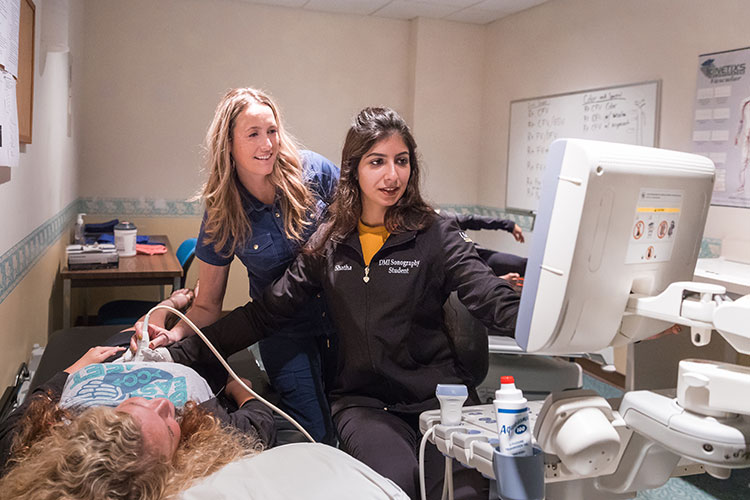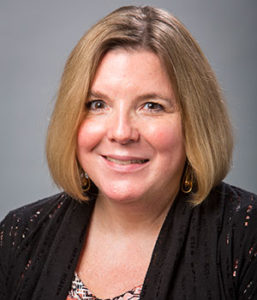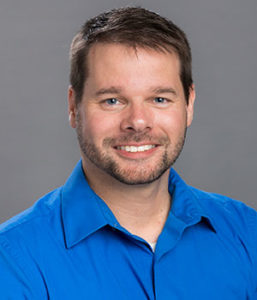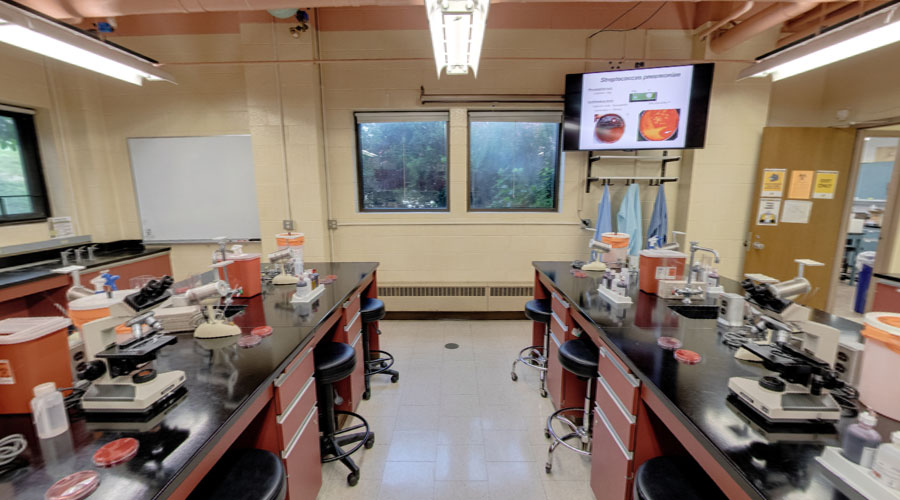Biomedical Sciences: Diagnostic Medical Sonography BS
The Diagnostic Medical Sonography Program is a rigorous, four-year undergraduate program that requires completing four or more semesters of preclinical course work to prepare for the two-year professional and clinical training.
Program affiliates offer two main clinical tracks: Abdomen/OBGYN/Vascular or Echocardiography/Vascular. Students can be invited to interview with each program. Those offered admission from one of the clinical affiliates complete the program and graduate with a BS degree in diagnostic medical sonography.
Program Type
Major
Program Format
On Campus
Diagnostic Medical Sonographers…
“…use high-frequency sound waves (ultrasound) to produce dynamic visual images of organs, tissues or blood flow inside the body – a critical tool to aid physicians in the diagnosis of disease.”
If you are interested in the anatomy, science, imaging, examination, detection or physics, then diagnostic medical sonography might be a good fit for you.
Your work may take you to a wide variety of settings, including hospitals, clinics, physicians’ offices, diagnostic laboratories and public health facilities.

Students may apply to the following clinical affiliates:
Occupational Description (from CAAHEP*)
The diagnostic medical sonographer provides patient services using medical ultrasound (high-frequency sound waves that produce images of internal structures). Working under the supervision of a physician responsible for the use and interpretation of ultrasound procedures, the sonographer helps gather sonographic data to diagnose a variety of conditions and diseases, as well as monitor fetal development.
Job Duties (from CAAHEP*)
The diagnostic medical sonographer provides patient services in a variety of medical settings where the physician is responsible for the use and interpretation of ultrasound procedures. In assisting physicians in gathering sonographic data, the diagnostic medical sonographer is able to:
- Obtain, review and integrate pertinent patient history and supporting clinical data to facilitate optimum diagnostic results.
- Perform appropriate procedures and record anatomical, pathological and/or physiological data for interpretation by a physician.
- Record and process sonographic data and other pertinent observations made during the procedure for presentation to the interpreting physician.
- Exercise discretion and judgment in the performance of sonographic services.
- Provide patient education related to medical ultrasound.
- Promote principles of good health.
*CAAHEP is the Commission on Accreditation of Allied Health Education Programs.
Employment Outlook
Earnings
In 2020, the median annual wage for diagnostic medical sonographers was $77,790. The lowest 10% earned $53,790 and the highest 10% earned $105,340. Echocardiography sonographers median average wage was $60,940. The lowest 10% earned $30,140 and the highest 10% earned $96,790.
Expected Growth
Employment of diagnostic medical sonographers is projected to grow 14% from 2020 to 2030, much faster than the average for all occupations.
Successful Alumni
The School of Biomedical Sciences & Health Care Administration has many successful alumni. These alumni have taken their degrees and have excelled in their careers.
Visit our Alumni page and be inspired by where a health sciences degree can take you.
Related Programs
Admission Criteria
Admission to professional training is competitive and not guaranteed. Students admitted to clinicals follow the curriculum specific to the their site and must comply with site-specific rules/policies that govern behavior in the professional setting, grading standards, and related issues or activities. Please note this includes evidence of health insurance coverage and successful completion of a background check, drug screen and physical prior to the start of the professional curriculum.
Students admitted into the professional training component complete their junior and senior years at one of the clinical affiliate professional training sites.
Entry into professional training is competitive and dependent upon:
- Completion of UWM’s General Education Requirements (GER).
- Completion of all required courses and electives in the freshman and sophomore semesters by May prior to the following fall start of the professional training.
- Minimum UWM cumulative GPA of 3.00.
- Students are required to complete certified nursing assistant (CNA) training, obtain certification, and earn at least 100 hours of patient care experience.
Additional requirements vary by clinical training site and program.
Students are encouraged to meet with their academic advisor for more detailed information related to progression into professional training. To schedule a meeting with an advisor, call 414-229-5047.
Background Check
Clinical affiliates hold meetings for admitted students for onboarding and to give information on background checks.
Application Process
Prior to each fall semester, a mandatory meeting is held for students ready to apply to the clinical training. You will be notified ahead of time and will receive the most current application information at the meeting.
After the information session, students will gain access to the Sonography Application Site, where they will submit their application materials electronically. Those materials may include the following: program application, personal statement, information on two references, proof of patient care experience and CNA certification, and proof of job shadowing.
Review of Applicants
The College of Health Sciences Office of Student Affairs and the program director will review all application materials and transcripts to verify that the application criteria have been satisfied.
Clinical Placements
- Admission is highly competitive. Students wanting more information are encouraged to meet with their advisor.
- Affiliates each maintain their own admission process and will notify students who are invited for admission.
- Students invited for admission have conditional admission and must successfully complete all academic requirements in order to advance.
Each of the University of Wisconsin-Milwaukee diagnostic medical sonography clinical affiliates administers their own curriculum.
- Pre-Professional Coursework (PDF)
- Aurora St. Luke’s Abdomen/OBGYN/Vascular Professional Curriculum (PDF)
- Aurora St. Luke’s Echo/Vascular Professional Curriculum (PDF)
- Froedtert Abdomen/OBGYN/Vascular Professional Curriculum (PDF)
- UWHC Abdomen/OBGYN/Vascular Professional Curriculum (PDF)
- UWHC Echo/Vascular Professional Curriculum (PDF)
To schedule an advising appointment, call 414-229-5047 or visit Northwest Quadrant Building B, Room 6425.
When should I meet with my advisor?
You are encouraged to meet with your advisor at least once per semester to ensure timely progress to graduation.
- Enrolling for spring semester?
Schedule an appointment with your advisor in October or November. - Enrolling for fall semester?
Schedule an appointment with your advisor in March or April.
You are also welcome to schedule an appointment with your advisor at any time to discuss academic challenges, career opportunities or any other questions.
How can my advisor help me?
The College of Health Professions & Sciences boasts professional academic advisors who understand the challenges of balancing academics, work, family and the social aspects of college life. Advisors partner with you to:
- Explore your academic and career interests
- Plan the sequence of your courses
- Prepare for course enrollment
- Access tutoring and other academic support
- Identify opportunities for campus involvement
- Connect you to campus resources
- Plan for graduation
- Head of School, School of Biomedical Sciences & Health Care Administration
- Associate Dean for Academic Affairs
- Associate Professor, Biomedical Sciences
- dollj@uwm.edu
- 414-229-4840
- Enderis Hall 899
- Associate Professor, Biomedical Sciences
- Executive Committee Chair
- nardelld@uwm.edu
- 414-251-9074
- Enderis Hall 493
- Clinical Associate Professor
- Sonography Program Director
- salzwed6@uwm.edu
- Northwest Quadrant B 6531




